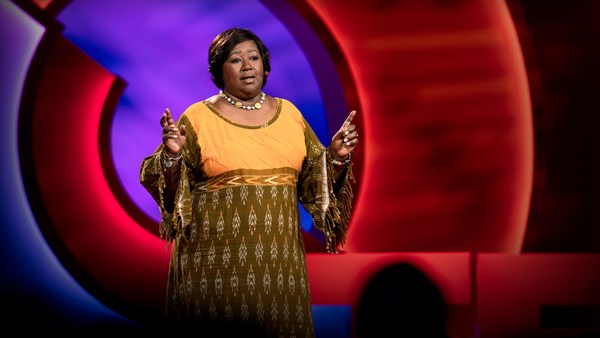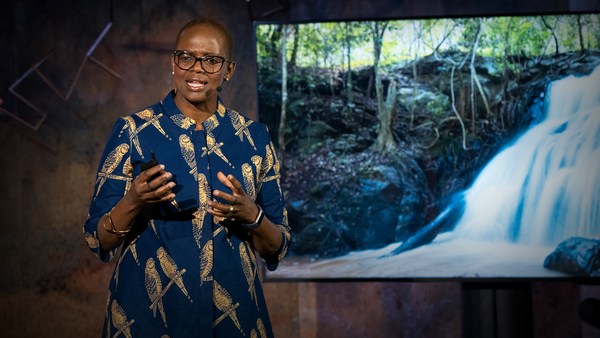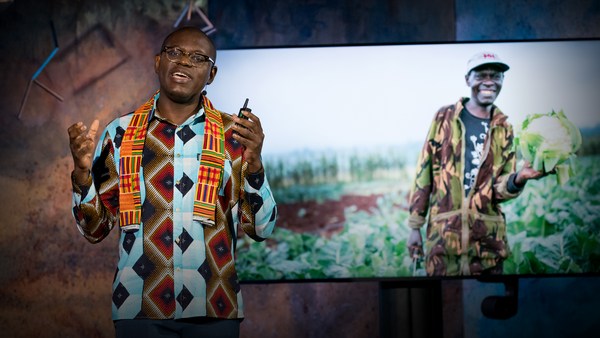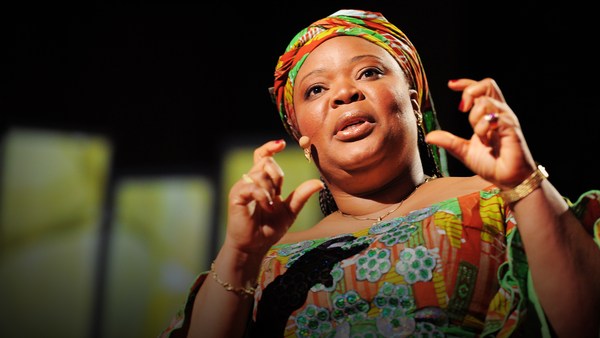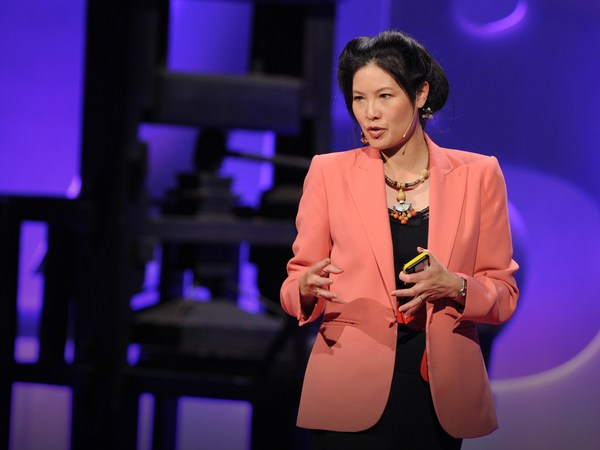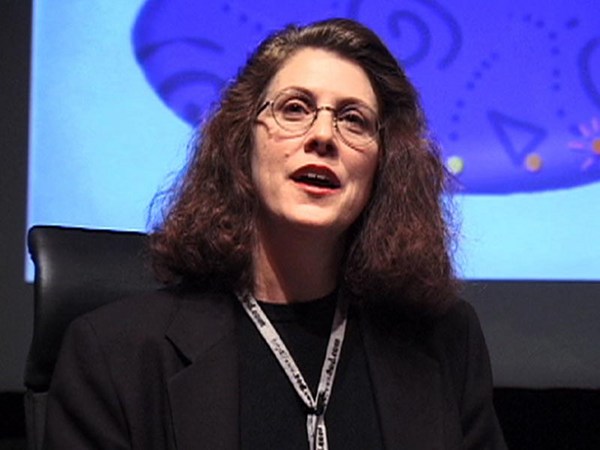Most of you will know about the challenges faced by my beloved continent, Africa. Too many people are poor. Millions of girls don't have access to school. And there aren't enough jobs for the rapidly growing population. Every day, 33,000 new young people join the search for employment. That's 12 million for three million formal jobs. In sub-Saharan Africa, less than one in four young people are likely to get waged or salaried work. The chances of making a secure living are even slimmer for poor and rural young women. They cannot afford an education. And they do not have the same access to wages, loans or land as men. This leaves entire communities trapped in a vicious cycle of poverty, inequality and hopelessness.
But I'm not here to narrate the doom and gloom, because we also know that a youthful population presents an opportunity to kick-start economic growth and solve global challenges. And in fact, there is a growing movement in Africa, of educated young women, who are stepping up and using the power of their network and a tool we call social interest to uplift communities.
I'm one of the leaders of the organization behind this movement. An organization that also supported me through school. And I have seen social interest multiply the impact of our work. Social interest is a way to pay back interest on a loan through service, rather than dollars. Sharing time and knowledge through mentoring, academic support, business training to others in need. This means the impact of a loan is felt not by one, but by many.
Through this system, we've been able to help and send more and more girls to school, support them while they are there, help them start businesses and ultimately, lead in their communities -- all while providing funding for the next generation. Social interest can be used to supercharge any movement where the benefits can be paid forward.
Let me give you an example. This is Stumai from rural Tanzania. She tragically lost her father when she was just three years old. Leaving a disabled mother to single-handedly raise her and her five siblings. Once Stumai completed primary school, she was about to drop out of school and become one of the 92 percent of girls in sub-Saharan Africa that never finish high school. Instead, she got lucky. She got support from a nonprofit that paid her fees and kept her in school.
But upon graduating high school, she faced a daunting challenge of what's next. She knew she had to start her own business to survive. And to help her mother, who had tried so hard to keep her in school by selling her only assets, a stack of corrugated iron sheets she had been saving in the hope of building a better home for her children. Stumai also knew she wouldn’t get a loan from a traditional bank, which generally considers young, rural women like her, without land or assets, unbankable.
Through a special group of lending partners, she secured 350 dollars to start a food shop, selling vegetables, oil, rice, tomatoes, onions and beans. Fellow network members helped to train her on basic business skills, like creating a business plan, working out profits, marketing, keeping business records and the value of savings. And the business took off. She repaid the original loan within eight months, and then borrowed 2,000 dollars to start a motorcycle taxi and courier business.
Stumai now owns two motorcycles and employs two people. And she has been able to purchase land and build a house, and the business continues to grow from strength to strength.
Stumai repaid her interest in social interest. She paid social interest by providing mentoring to girls in a local high school. She volunteered weekly as a learner guide, delivering a life skills and well-being curriculum that helps children gain the confidence to ask questions, care for and support each other, learn about health and nutrition, set goals and learn how to achieve them. Stumai says her greatest reward is witnessing the girls she mentors start to believe in themselves and succeeding.
These days, Stumai also trains other learner guides. That's multiplying the number of girls making it through school and into secure livelihoods like she did. Through her business profits, she has been able to support her siblings, three nieces and nephews and other children in her community to go to school. She also regularly supports other network members. For example, a young woman studying for a diploma in community development. In the past two years, Stumai helped her with money for bus fare, for sanitary pads, for soap and encouraged her to keep going. Stumai spends 370 dollars a year supporting the education of others. That's 17 percent of her gross earnings from her motorcycle business. This is the power of social interest.
Stumai's example shows that if you help one girl, not only to go to school, but graduate and start a business, she can in turn make a giant difference in the lives of others and her community. Had Stumai paid back interest on her loan in dollars, her success might have been felt by her and her immediate family, but because she paid interest as social interest, the impact was felt by her mentees, her nieces, nephews, her employees and so many others around her. Stumai is just one example of many.
Today, we have 7,000 learner guides like Stumai, working across Malawi, Tanzania, Ghana, Zambia and Zimbabwe. And collectively, they've helped children do better in school. The girls we work with are nearly three times less likely to drop out of school, because learner guides make home visits when girls fail to attend school to help them back on track. They also work with communities and district governments to address the challenges children face, including preventing or annulling child marriages, connecting children facing hunger or hardship at home with local support, or running study groups so that children who might be lagging behind in their studies can get supporters and catch up. They act as trusted sisters, friends and guardians.
So far, nearly 6,300 network members have borrowed close to three million dollars, with a repayment rate of those loans at consistently above 95 percent. And our 140,000 members, they have invested their own resources to support and send over 937,000 children to primary and secondary school. Every young woman we work with supports, on average, another three children outside of her immediate family to go to school. All without additional money from us.
We are building a powerful force. Gaining ever greater momentum as we open the door for more and more girls to go to school, succeed, lead and in turn, support thousands more. This system, supporting those once excluded to transform their lives and then step up for others, can work for more than girls' education. Of course, you need to get your money back if you lend it. But instead of demanding interest in dollars, can you consider using social interest instead?
For example, could young people pass on the skills they learned in training colleges? Like Michelle, who teaches brickmaking in rural Zimbabwe. Or Louisa, who is training others on climate-smart agriculture in Malawi. Or Fatima in Ghana, who is training women to help deliver babies where expectant mothers might not be able to make it to the local hospital on time.
When I was growing up, an elder in my village in rural Zimbabwe once described the challenges I faced in going to school. She said, "Those who harvest many pumpkins often do not have the clay pots to cook them in."
(Laughter)
What she meant was that, although I got the best possible results in my exams when I finished elementary school, my talent was of no value if my family could not afford to pay for me to continue my education. Well, with this system, we are not just providing pots, or making a single meal out of the pumpkins. After all, there are hundreds of seeds in a single pumpkin. We are saving the seeds, planting them and nurturing every one of them. And the result? A virtuous cycle of prosperity, equality and hope, led by young women. Because together, we are shaking up the world. Pamoja tunaweza -- that's Swahili for my network motto: "Together we can!"
Thank you.
(Applause)
